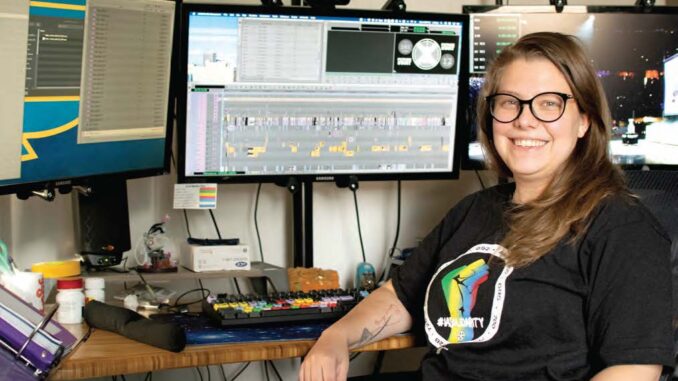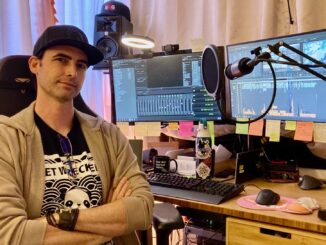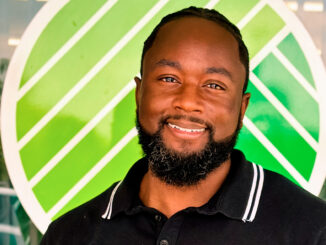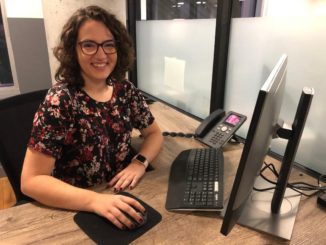
Q Where are you currently employed?
Paramount studios.
Q Current projects?
I’m a second assistant editor for a feature at Paramount. Before this project, I worked with editor Josie Azzam on a short film for Netflix. Through the pandemic, also for Netflix, I was an assistant on season two of “Never Have I Ever” and part of the assistant team with Matt Latham on “Operation Varsity Blues: The College Admissions Scandal.”
Q Describe your job.
As an assistant editor, I anticipate various needs – technical, creative, and anything in between — to help make sure the editorial staff runs smoothly. This can include temp sound clean up, exports, and turnovers to various other departments. Sometimes there is troubleshooting involved in trying to figure out what the hell that Avid error message means, or even some creative troubleshooting like how we can help the editor sell a visual idea with graphics, temp visual effects, or creative brainstorming.
Q How did you first become interested in this line of work?
I’ve always been fascinated with the craft and skill that goes into filmmaking. When I was in about sixth grade, we had to write a report on a career we might be interested in. I chose the film industry, but my teacher wanted me to be more specific, so after poring over a bunch of lists and reading up on all the different credits behind the scenes, I discovered what editing was. I’ve always been obsessed with figuring out puzzles, and that’s how I see editing: they’re giant story puzzles that sometimes fit together super-easily, sometimes not, but they can be played with until you reveal the emotion, even if the continuity is off. Ever since then, I’ve been working to become an editor.
Q Who gave you your first break?
From the time I left non-union reality work, I’ve been very fortunate to find my way into union work. Assistant editor Alan Mackulin recommended me for several things. Many other assistant editors have helped along the way and taught me so many things—Chris Visser, Monica Daniel, and Shiran Amir, to name a few. Editor Matt Friedman gave me my first union job on a low budget independent feature called “The Boy Downstairs.” Since then, I’ve networked and got to work with editors Phillip Bartell, Kristina Hamilton-Grobler, Waldemar Centeno, Jonathan Angus, and assistant editors Jessica Sisk and Josie Azzam.
Q What was your first union job?
That low-budget independent feature, “The Boy Downstairs.” It’s a sweet New York romantic comedy about a young woman who moves into an apartment that happens to be above her ex.
Q What credits or projects are you proudest of, and why?
Two for Netflix—the film “To All the Boys I’ve Loved Before” and the TV series “Never Have I Ever,” both for pretty much the same reasons. They have beautiful stories filled with representations of independent and strong women learning how to live in this world, and underlying themes about how we can cope with grief and mental illness. I lost my grandmother right before starting work on “To All the Boys…”, and it helped me through that time because one of the sub-plots involves the main character learning how to process and deal with the loss of her mother. When I watched season one of “Never Have I Ever,” in which the teenage main character’s father dies, my husband and I were in lockdown and his mother was very sick, ultimately passing away. When I got the call that I would be working on season two, I cried. After dealing with intense dark moments, it was nice to work on such light and fun but also poignant stories.
Q What was your biggest challenge in your job (or on a particular project) and how did you overcome/solve it?
It’s hard to nail down one challenge that’s bigger than another. Assisting on TV and features can often be like herding cats. If anything, I’ve learned how to manage my time better and anticipate priorities. I’m a trauma survivor and deal with PTSD, so some of my greatest struggles come out of managing triggers. I have a service dog, Xander, that comes to work with me. I utilize white boards and a bullet journal to keep track of tasks and the like. But I think the greatest help has come from opening up and being honest with my co-workers about my PTSD. It’s not for everyone, but the way to correct misconceptions and destigmatize mental illness, PTSD in particular, is by giving it a face and a name. Once I stopped trying to hide it or pretend it was something that could not be named, things became a lot easier.
Q What was the most fun you’ve had at work?
Lunch time with the crew of “Shooter,” season three. We had this GIANT table where we would all take a break and talk for an hour. In the office, there was a giant cutout of the show’s star, Ryan Phillippe, that someone would hide around a corner, or do something else to get a jump out of someone.
Q Jobwise, what do you hope to be doing five years from now?
I am not a five-year planner. I tend to take things one year at a time, but I hope to be working on more fun and important stories. Maybe as an editor, or at least starting to cut more.
Q What are your outside activities, hobbies, passions?
Anyone who knows me knows that I am a MASSIVE St. Louis Blues fan. I try to watch or listen to every game during the season, and I’ve been known to be very vocal when the team makes poor decisions. I am also an avid crafter and baker. For the car paints [during negotiations with the AMPTP, the Guild painted supporters’ car windows with pro-union statements], I made keychains for all the volunteers (if you didn’t get one, please reach out!) as well as gooey butter cake for the office staff.
Q Favorite movie(s)? Why?
“Silver Linings Playbook.” The way disassociation and obsession scenes were portrayed really spoke to my experiences with PTSD. It helped me express what was going on inside my head when I couldn’t find the words.
Q Favorite TV program(s)? Why?
Historically, “Gilmore Girls.” I always watched with my mom or grandmother. Seeing flawed but well executed female characters on the screen, big or small, has been rare, unfortunately. As I’ve grown up, I’ve come to relate differently to each of the characters, and the performances are fantastically layered. It’s often like sitting down and getting a nice warm hug. Currently, “Ted Lasso.” As a Midwesterner in a big city, I find it nice to get a dose of wholesome Kansas-boy logic. The show is so well written, acted, and edited. I remember seeing the clip at virtual EditFest 2020 and instantly feeling the need to watch.
Q Do you have an industry mentor?
I have a lot of mentors for different things. I consider them more friends than official mentors. Monica Daniel is someone I’ve gone from looking up to, to having weekly game nights and ongoing conversations about Marvel movies. Richard Sanchez has been a huge resource for questions about assisting, puppies, and sometimes life in general.
Q What advice would you offer to someone interested in pursuing your line of work?
First, be yourself. You can learn the gig, but if you’re pretending to be someone you’re not, it can be unhealthy for you and for the people around you. Second, be kind to yourself and to others. It costs you nothing but you gain so, so much.
Q Was there ever a circumstance when you had to rely on the Guild for help or assistance?
In my case, I didn’t need assistance for anything specific. When I was starting out, the low budget features contract I was working under allowed for a field rep to visit the work site, say hi, and see how we were doing. I was fortunate to have the same field rep every time, Karen Greene. She answered my questions and, after the third time or so, brought dog treats. She remembered who I was. That early attention and education helped me to be more comfortable about coming to the Guild with bigger issues and also to become more involved with the Guild. Our community can seem daunting to break into, but this early one-on-one time with a representative made an especially positive lasting impact on me, personally and professionally.
Q Is there anything you’d like to say to your fellow Guild members, some words of encouragement?
You are going to make mistakes, but don’t let the fear of that prevent you from learning something new; now THAT would be a mistake. Not knowing something because you were afraid to make a mistake could ultimately hurt your career more than making the mistake would. Working in editorial can be overwhelming. It’s okay to not know everything. We all start somewhere, and we learn new things with every project. Try to be kind to yourself, and remember: as you learn, things get easier, faster, and more creative.
Compiled by David Bruskin.





